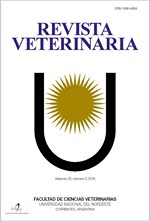Effect of premating supplementation with monopropylene glycol on reproductive performance of dairy cows
DOI:
https://doi.org/10.30972/vet.1711964Palabras clave:
Dairy cow, monopropylene glycol, pregnancy, anoestrus, body condition.Resumen
Prolonged postpartum anoestrous intervals (PPAI) are the major source of infertility in New Zealand dairy cows. Postpartum supplementation with monopropylene glycol (MPG), under controlled experimental conditions, was previously shown to reduce PPAI in heifers. This experiment tested this treatment in four large commercial dairy herds. During the 6–week period preceding the planned start of mating (PSM, week 0), cows were drenched either once (MPGx1) or twice (MPGx2) daily with 200 ml MPG, or served as untreated controls. A total of 2,122 cows were included in the analysis (n = 684 to 714 per treatment). None of the four variables: oestrous behaviour during the treatment period, anoestrous rate one week before PSM, 3–week submission rate, or 3–week pregnancy rate were affected by MPG. However, MPG did increase the 6–week and final pregnancy rates (p<0.005), with MPGx1 having higher values (74.6% and 92.1%) than MPGx2 (69.1% and 88.5%) and control (67.7% and 88.1%), respectively. MPG cows also produced more milk protein than the control cows, by 0.01 and 0.017 kg of milk protein per day for MPGx1 and MPGx2, respectively (p=0.02), evidence of a metabolic effect of MPG. Recent studies suggest that diets that are optimal for follicle growth are not necessarily optimal for oocyte quality and subsequent embryo survival. It is hypothesised that MPGx1 had positive effects on the follicle/oocyte through gonadotrophin–independent mechanisms and that MPGx2 had negative effects on the embryo. Probably the gonadotrophin–dependent effects necessary for ovulation could not be exerted in the present study because MPG was not administered for sufficient time to effect the LH surge. Both change in body condition score (BCS) between week –6 and week –1, and proportion of cows that were anoestrus at week –1, were influenced by herd, age and time of calving (p<0.05) but not by treatment (p>0.1). Change in BCS affected both milk yield and pregnancy rates, with cows that gained BCS producing less milk (p=0.01) but showing higher 6–week pregnancy rates (p<0.05). This study highlighted that key factors influencing the percentage of anoestrus at PSM are cow age, time of calving and management of the herd.Descargas
Descargas
Publicado
Cómo citar
Número
Sección
Licencia
Derechos de autor 2006 G. Tuñon, T. J. Parkinson, C. W. Holmes, L. M. Chagas

Esta obra está bajo una licencia internacional Creative Commons Atribución-NoComercial 4.0.
Política de acceso abierto
Esta revista proporciona un acceso abierto inmediato a su contenido, basado en el principio de que ofrecer al público un acceso libre a las investigaciones ayuda a un mayor intercambio global de conocimiento. La publicación por parte de terceros será autorizada por Revista Veterinaria toda vez que se la reconozca debidamente y en forma explícita como lugar de publicación del original.
Esta obra está bajo una licencia de Creative Commons Reconocimiento-NoComercial 4.0 Internacional (CC BY-NC 4.0)










.jpg)
.jpg)



